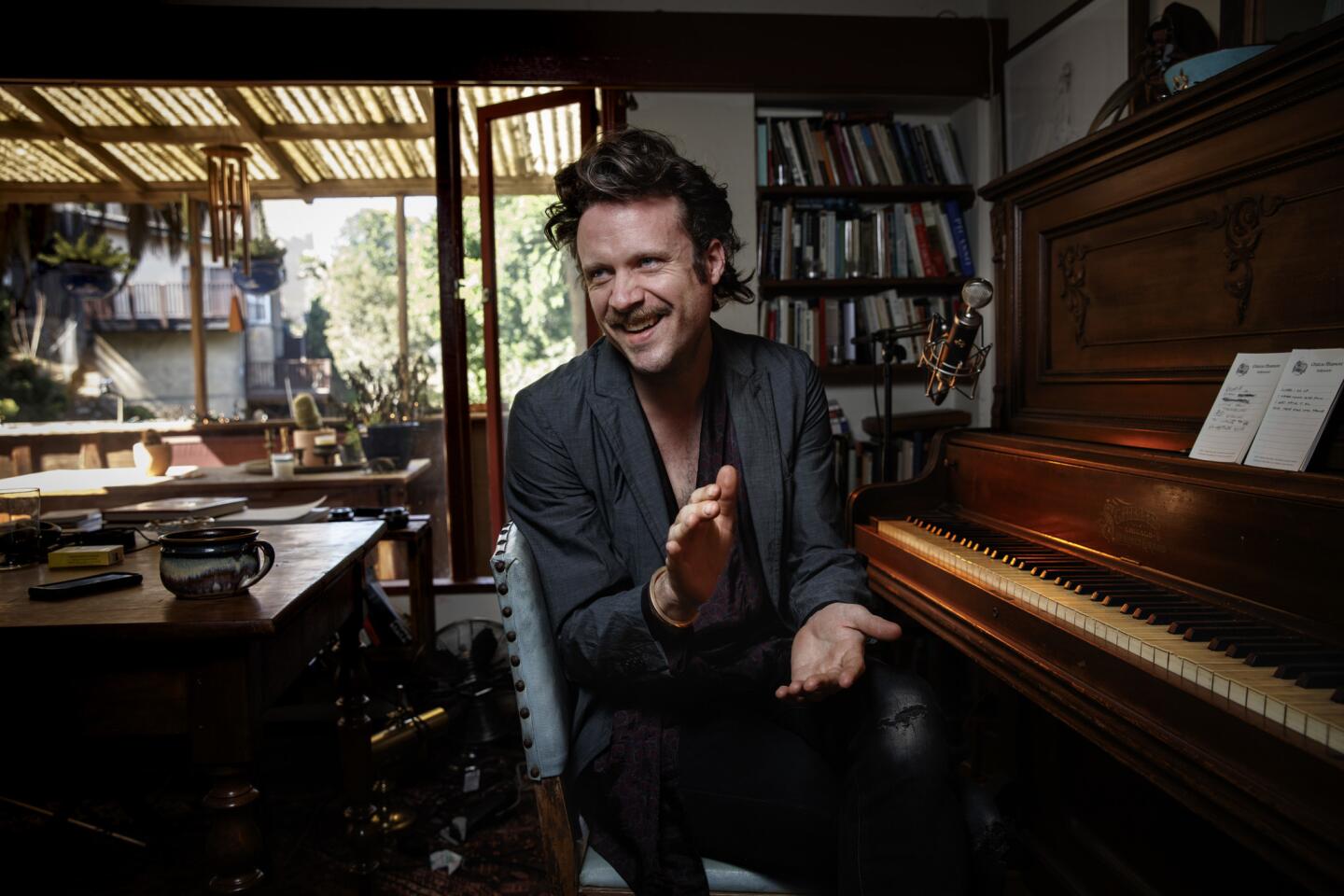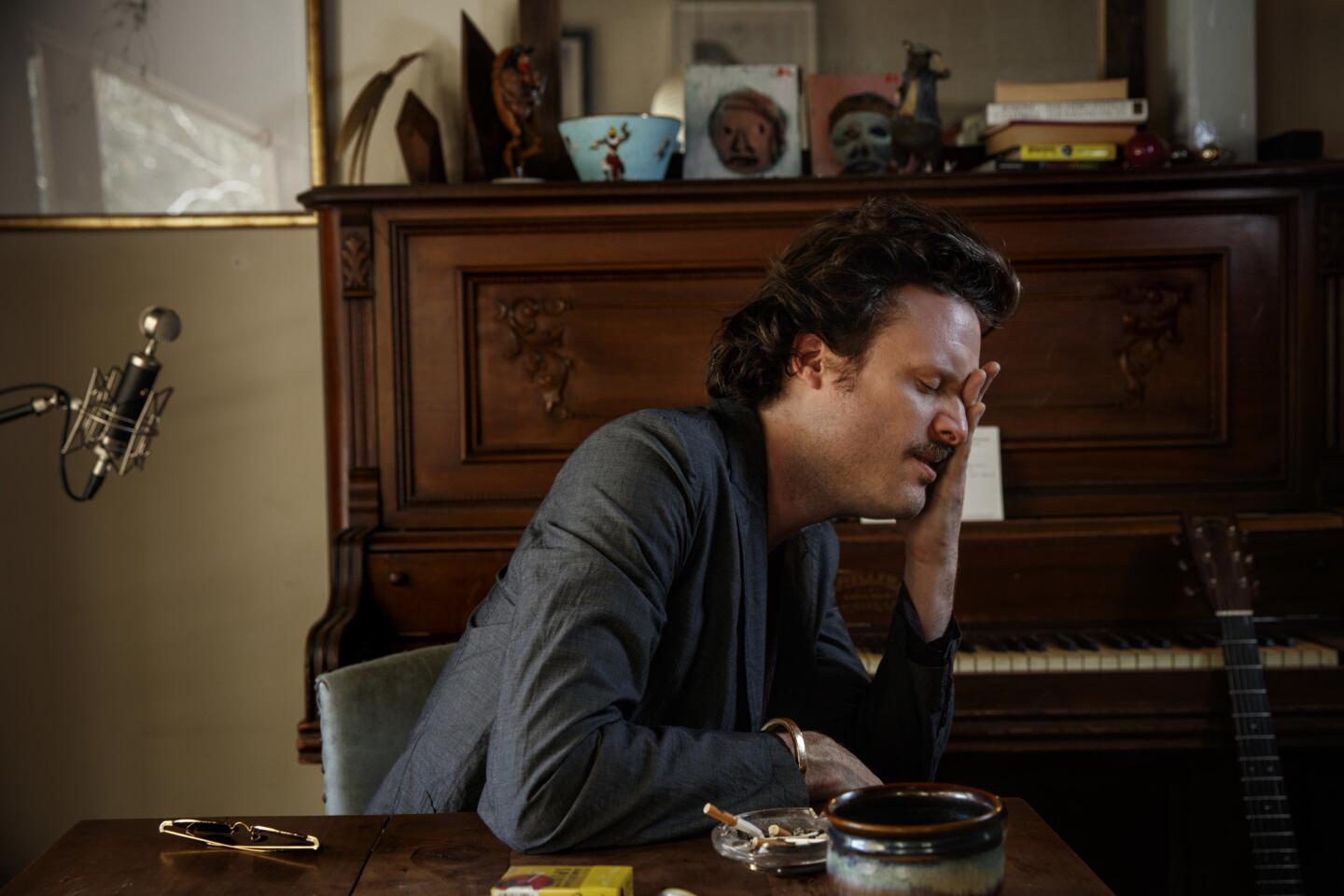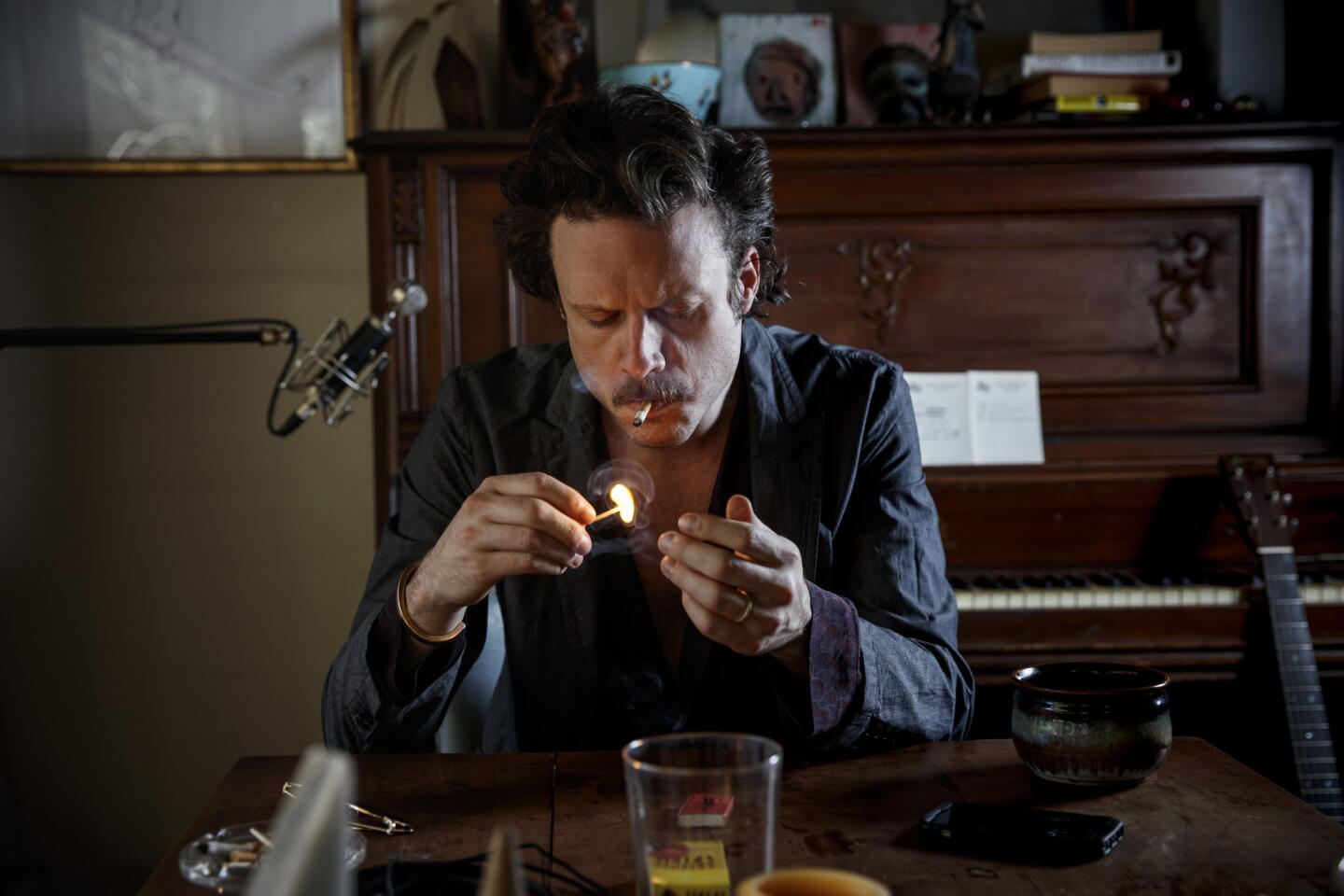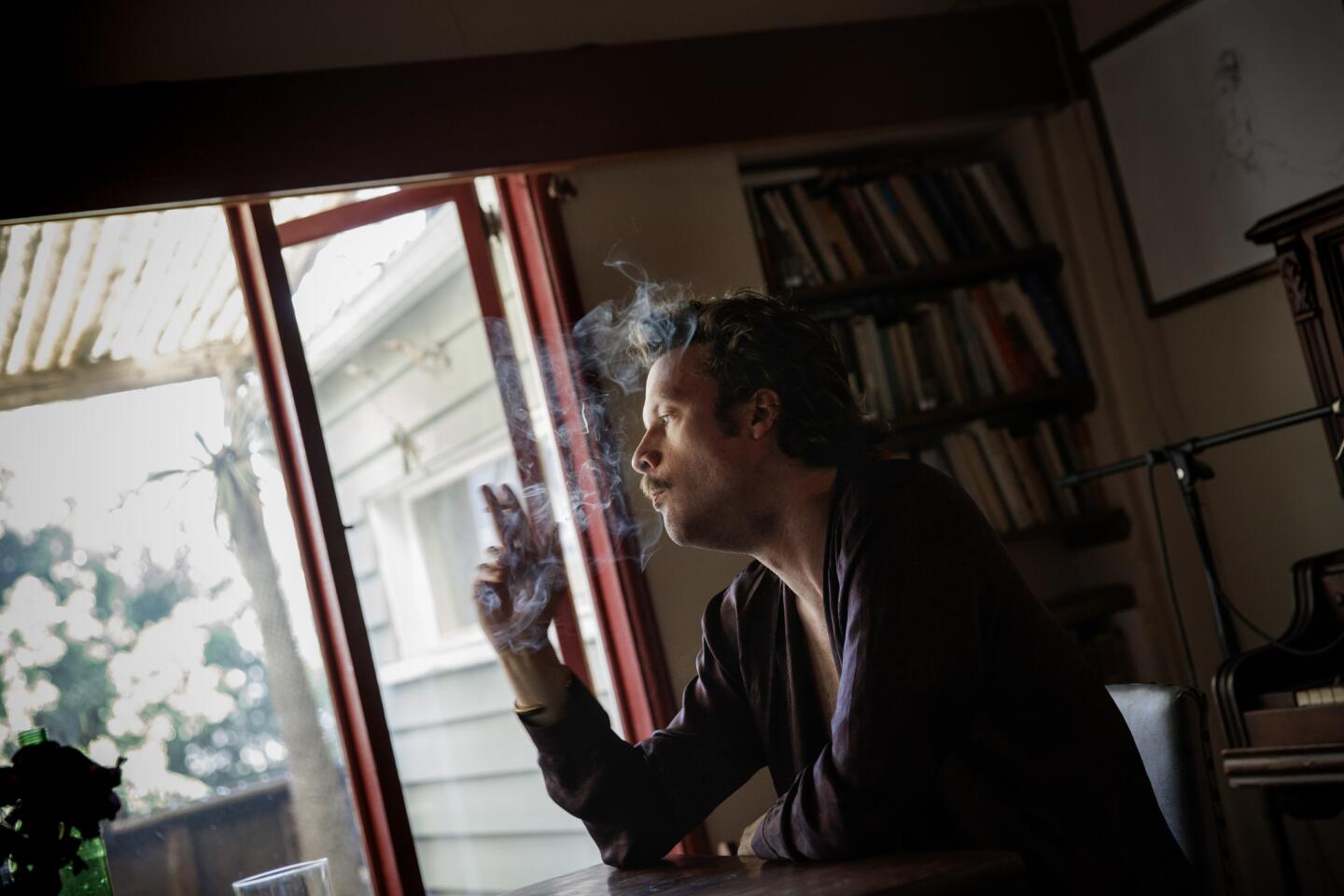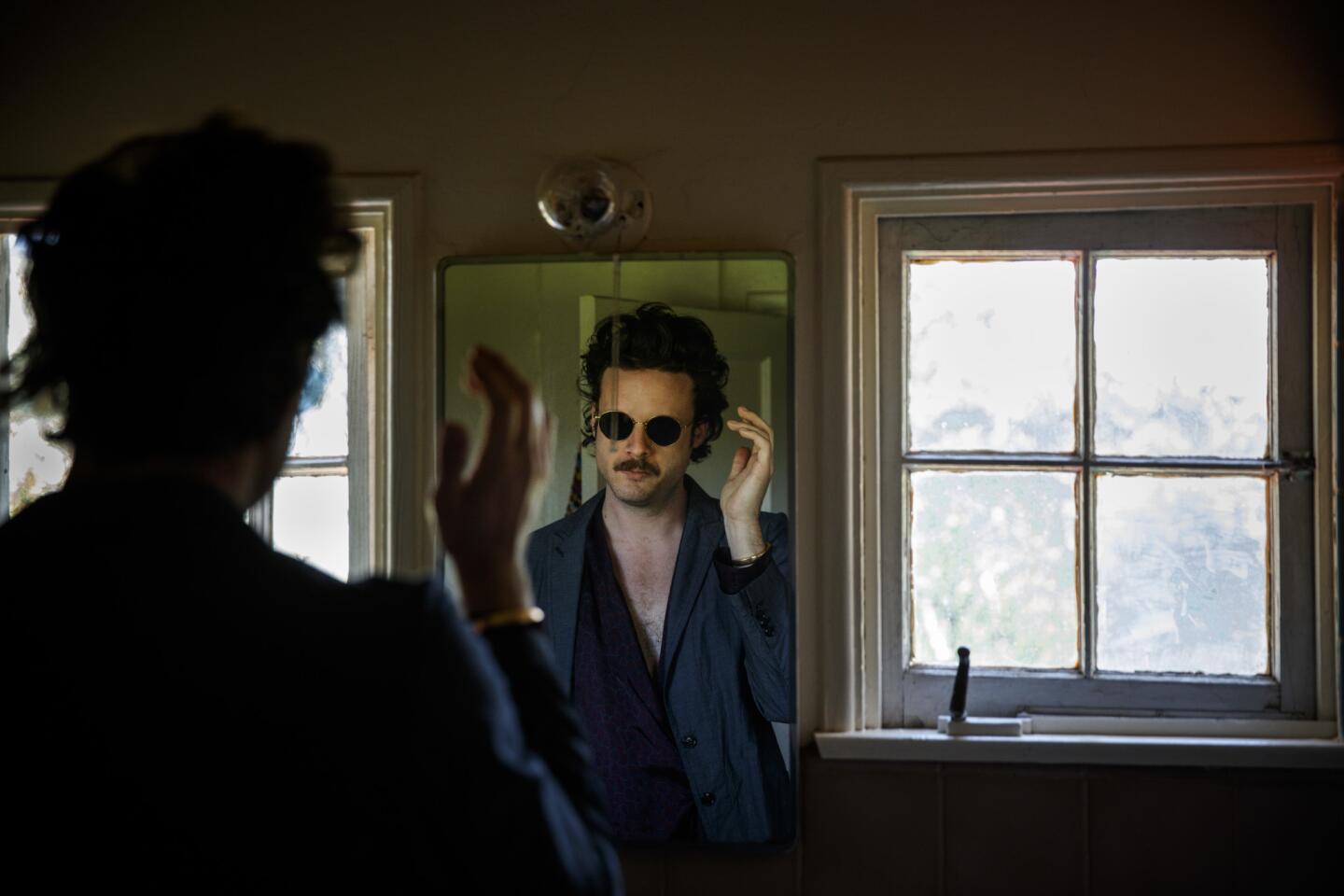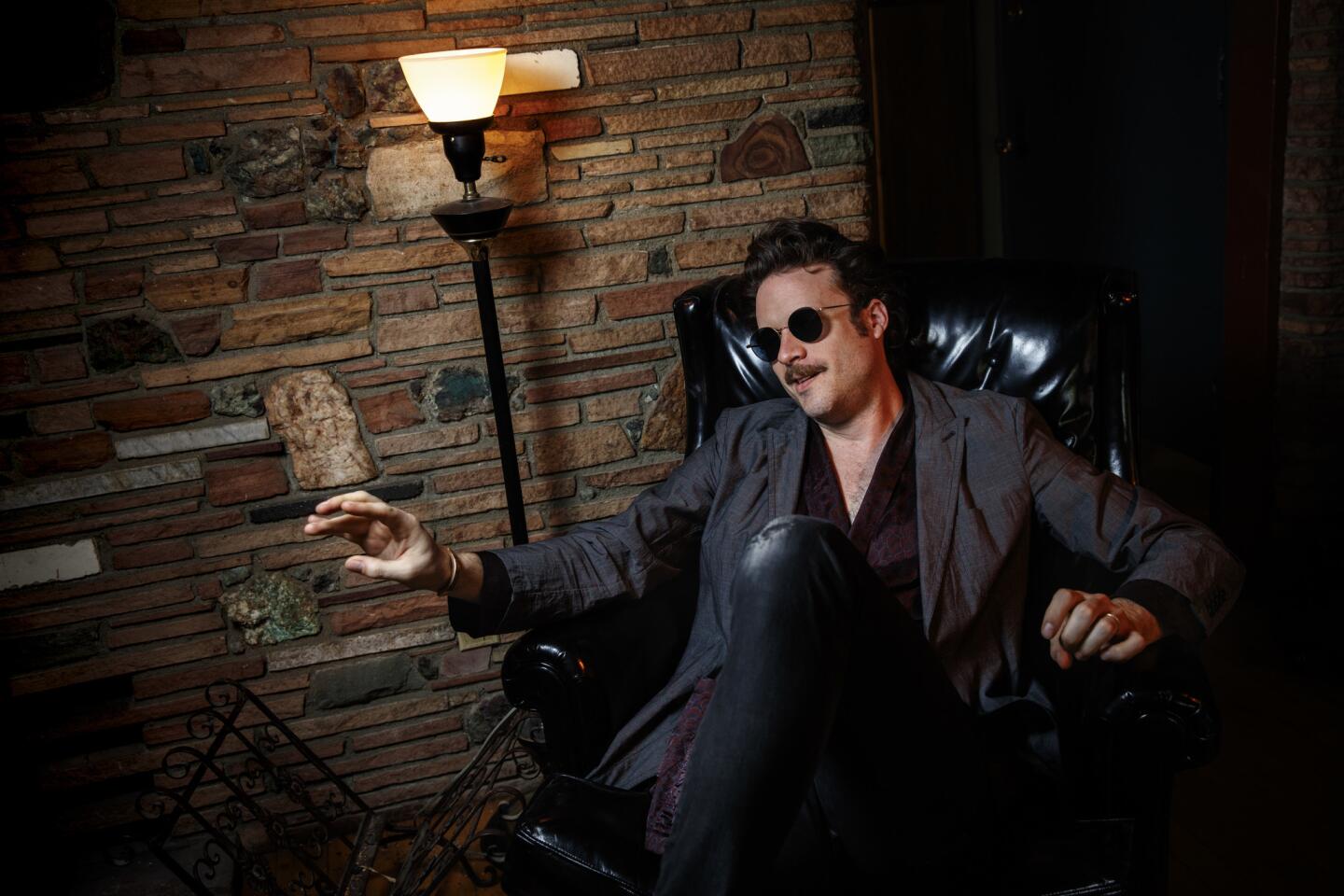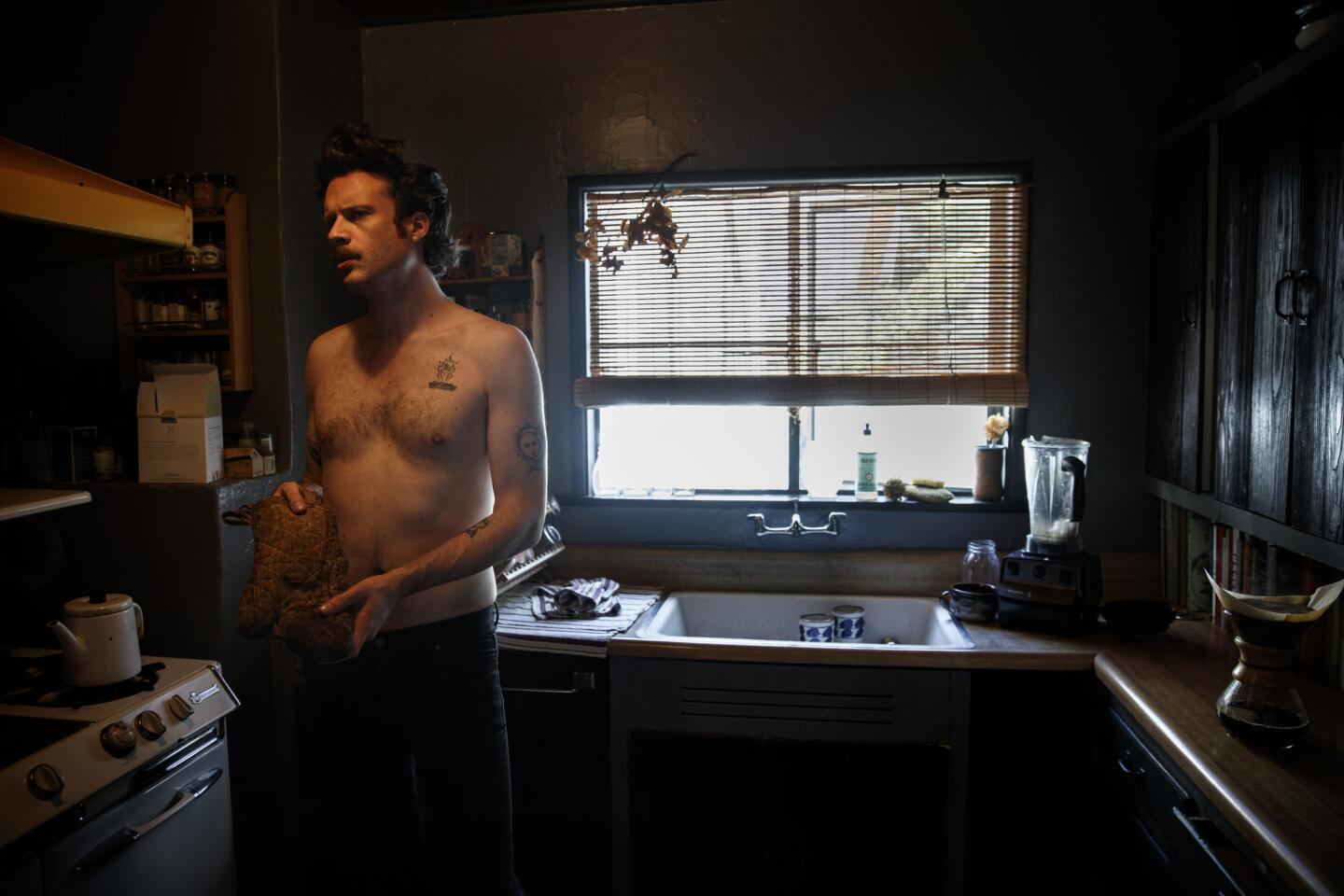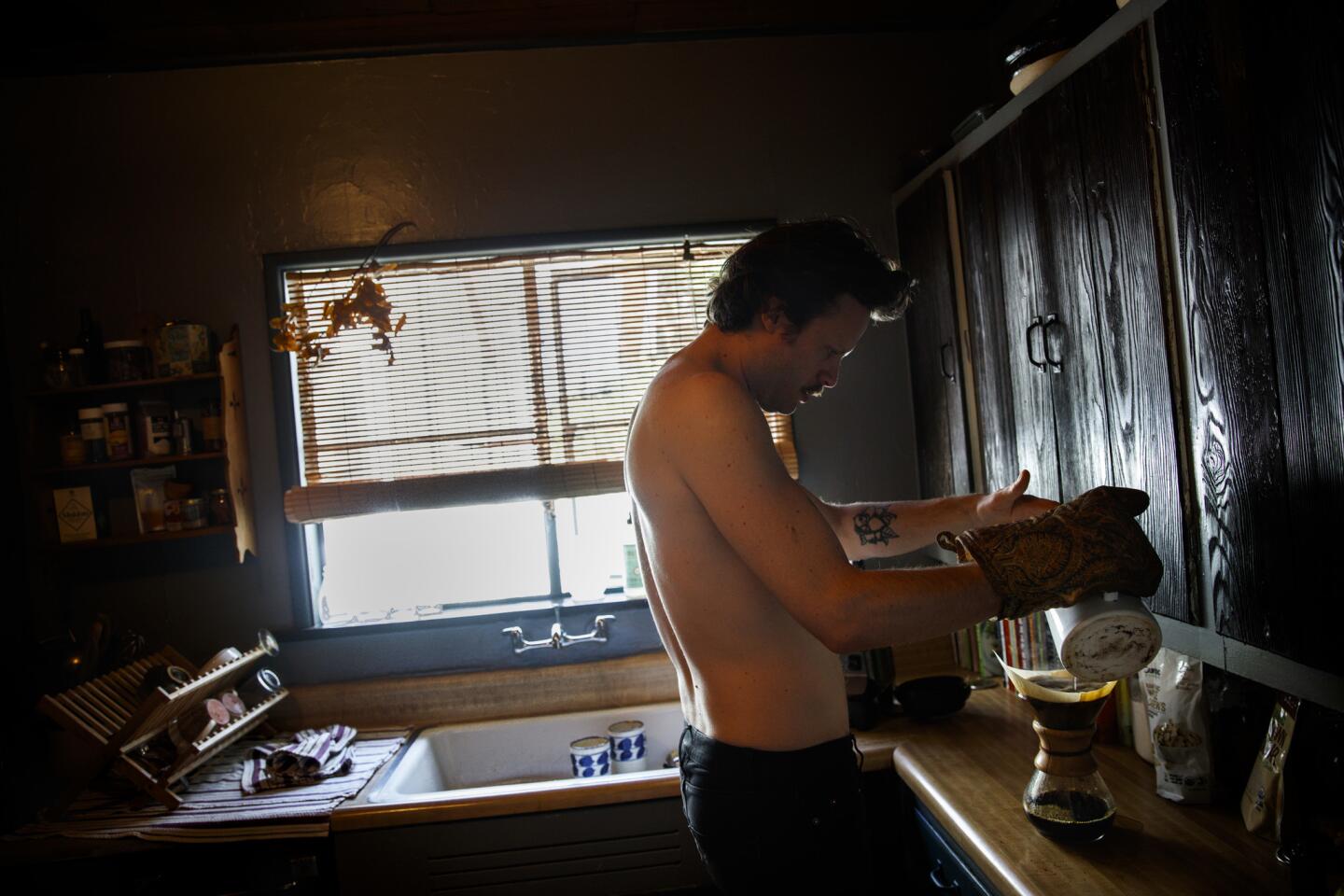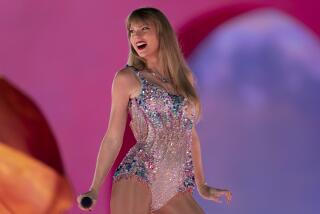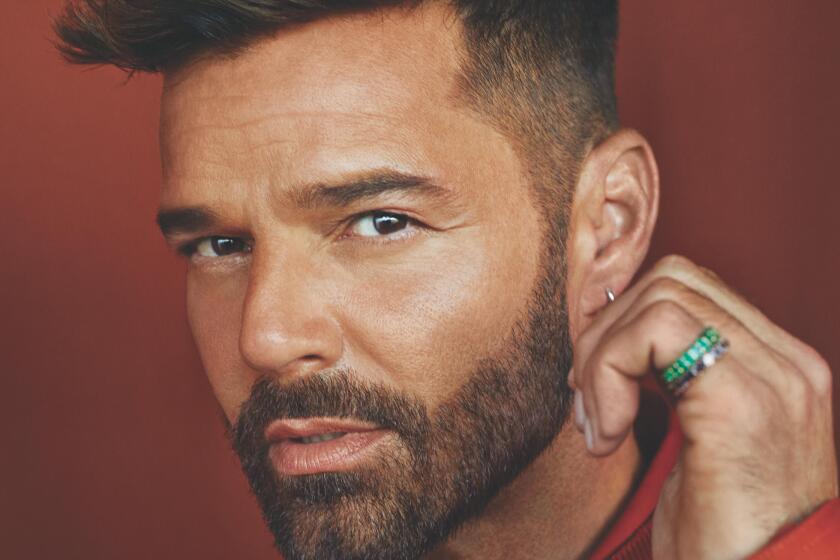At home with Father John Misty: ‘I’m basically a meme at this point’
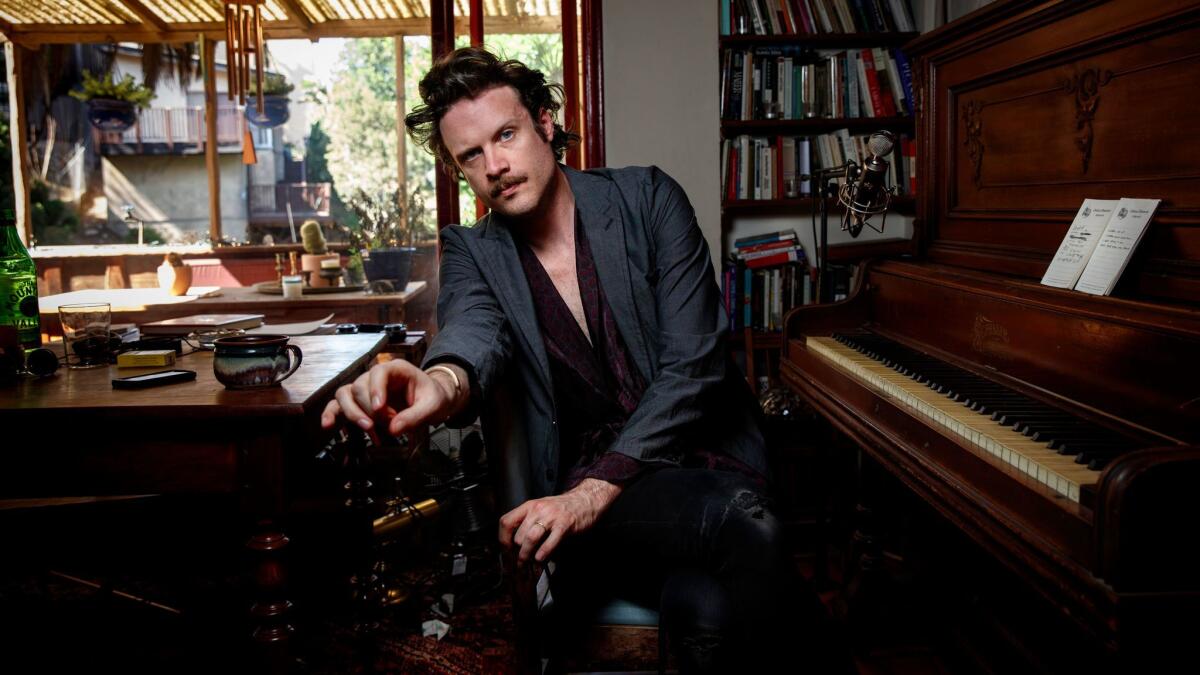
“You want some coffee?” Josh Tillman asked on a recent afternoon at his home in the Hollywood Hills. He wasn’t wearing a shirt, and as soon as he got to work in the cramped, overheated kitchen, it was easy to see why.
Better known by his stage name, Father John Misty, the singer measured beans into a blender while water warmed slowly in a kettle on the stove. He brewed the coffee using the connoisseur’s pour-over method and carefully stirred in coconut oil and almond milk.
Then, gesturing to a small vial on the counter, he suggested one final enhancement: a drop or two of LSD.
“You’ll love it,” he said as he wiped his moistening brow.
Psychedelic drugs figure prominently in the Father John Misty story. It was after ingesting mushrooms for the first time that Tillman says he experienced a moment of clarity that led him to cast off his old accomplishments — eight albums of depressive folk music recorded under the name J. Tillman, as well as a stint playing drums in the rustic indie-rock band Fleet Foxes — and reinvent himself as a convivial (if polarizing) chronicler of society’s growing absurdity.
Cheerful provocation has been central to his act since 2012, when he released “Fear Fun,” his debut as Father John Misty. And it only increased with 2015’s acclaimed “I Love You, Honeybear,” on which he took up the fraught idea of privileged male sensitivity.
So of course this guy would offer acid to a stranger who’d just walked into his house with a notebook and recorder.
Except Tillman didn’t actually seem to be stunting (or at least he didn’t yet). Instead, his eagerness to share a mind-altering substance — if that’s what it was — felt like part of a larger effort to let others in on the unique way he views the world.
Certainly that’s the impression created by his sly yet compassionate new album, “Pure Comedy.” Due April 7, a week before he’ll perform at the Coachella festival in Indio, the record dials back some of the sarcasm and posing — and much of the busy musical action — of his previous work in favor of stately but earnestly presented tunes about the necessity of human connection

Musician Father John Misty explains how having the resources behind his recent album “Pure Comedy” makes all the difference.
To be sure, the music has layers; it’s streaked with worry and dark humor, particularly regarding the ways we use entertainment and technology as numbing agents. In “Total Entertainment Forever” — which sparked instant controversy when he performed it this month on “Saturday Night Live” — Tillman sketches a grotesque, “Black Mirror”-worthy scene of near-future wish fulfillment: “Bedding Taylor Swift every night inside the Oculus Rift / After mister and the missus finish dinner and the dishes.”
Then there’s “Ballad of the Dying Man,” in which the title character checks his newsfeed one last time before his final breath — “to see what he’s about to miss,” Tillman sings, his voice just as pitiful as that vision.
Ultimately, though, the singer’s message is as straightforward as it gets as he makes clear in the album’s closer, “In Twenty Years Or So.” That’s when he figures “this human experiment will reach its violent end.”
“But I look at you as our second drinks arrive,” he croons tenderly over swelling strings. “The piano player’s playing ‘This Must Be the Place’ / And it’s a miracle to be alive.”
Seated at his dining table, Tillman, 35, said, “I’m not trying to Trojan horse anything here. These sound like normal songs to me.”
The house, a kind of bohemian hideaway tucked behind a dilapidated wooden fence, was stuffed with records (Bob Dylan, the Velvet Underground) and books (Bukowski, Vonnegut); a mattress lay on the floor of the bedroom Tillman shares with his wife, photographer Emma Elizabeth Tillman. After making the coffee, Tillman had put on a silk kimono and lit the first in a series of cigarettes.
“You don’t put energy into drawing things into question if you don’t love them,” he went on. “This album is a love letter to humanity.”
In a sense, the apparent sincerity of “Pure Comedy” represents a return to Tillman’s earliest musical experiences. Growing up in suburban Maryland, he sang worship music in church — he can still belt Matt Redman’s “The Heart of Worship” from memory — before eventually souring on religion and moving for a time to Seattle without telling his parents.
Today he’s not exactly a model parishioner: Among the harmful distractions he identifies in “Pure Comedy’s” title track are “sacred texts written by woman-hating epileptics.”
Yet for too long, he admitted, he lived by the psychological notion of negative identity, basing his conception of himself in his fierce opposition to God. Reading Flannery O’Connor’s novel “Wise Blood” — about a rebellious preacher’s grandson who ends up consumed by thoughts of religion — opened his eyes to what was happening to him, and since then he’s learned to relax.
This also explains how the once-scruffy Tillman became a sharp dresser, as anyone who saw him play “SNL” could recognize.
“When I was in Fleet Foxes and we did [the show], I wore garbage clothes and refused to get hair and makeup,” he said. “And that to me is a kind of self-obsession: ‘I’m not one of these materialistic yuppie scumbags.’ This time I was like, ‘I’m gonna shave, I’m gonna look good, I’m gonna move around and put on a show.’ That’s much more honest to the enterprise.”
Honest or not, Tillman’s candid manner is hardly preventing people from misunderstanding him — or pretending to, anyway. “Total Entertainment Forever,” and specifically the lines about Taylor Swift, have inspired countless think pieces condemning him as a sexist instigator.
Does it surprise him that some listeners seem deaf to the horror with which he delivers the song — unconvinced that he’s describing a nightmare, not a dream?
“Oh, they’re not deaf to it,” he said. “It’s easy to say, ‘God, I can’t believe people are so literal.’ They’re not. They’re willfully ignoring context in order to generate outrage in order to generate clicks in order to satisfy the media conglomerate that owns them. And in order to justify that willful ignorance you have to make yourself look really smart by inventing terms like ‘toxic masculinity.’” He laughed, though not because he appeared to think it was funny.
“That is the rotted core of Internet culture.”
Tillman, who said he relates to “Girls” creator Lena Dunham (“We’re misunderstood in similar ways”), is clearly a creature of our modern pop moment. But there’s something old-fashioned about him too. He laid down much of “Pure Comedy” with a small band of professional players at United Recording, one of the most storied rooms in Hollywood; the sound they got is as handsome and direct as Neil Young’s “Harvest.”
“He was really into timelessness,” said Keefus Ciancia, who plays keyboards on the album. “It was about the heart and soul and emotion — like he’s just sitting there telling you a story.”
Tillman also resists selling his songs for use in commercials. “I know that nobody else cares, but I don’t like it,” he said, adding that he turned down $1.5 million in advertising opportunities last year. “‘Everyday People,’ Sly and the Family Stone — incredible song! Now I listen to it and just see a 4Runner.”
His stance is less rigid when it comes to working for pop stars with major corporate ties, as he did in 2016 for Beyoncé (on her song “Hold Up”) and Lady Gaga (with whom he co-wrote two tracks for her album “Joanne”).
At a hotel in New York recently he ran into another famous singer, he said, who declared herself a huge Father John Misty fan. They went up to his room and he played her half a dozen songs — “just things I’ve got lying around,” he said. “She’s like, ‘OK, all of these are mine.’”
His feelings on these encounters are mixed. The artists at the center of the pop industry are “beautiful people who are incredibly talented,” he said. (Ariana Grande is his favorite — “I just love her voice.”) But the process by which songs are created by committee “has really impoverished the word ‘writing.’”
“I could show you songs I’ve written pretty much front to back,” he said. “Then you get these emails that are like, ‘OK, here are the lyrics — your contribution is in blue, and so-and-so’s is in pink. And it’s like three pink words in a field of blue. But that’s a co-write.”
Still, he definitely gets a charge out of injecting his perspective into the mainstream. Of Lady Gaga’s “Come to Mama,” he said, “To have a pop song that says ‘The only prisons that exist are the ones we put each other in’ — I mean, that is a case of being able to mess with the salmon run in such an extreme, powerful way.
“I’m not doing what Ed Sheeran does,” he continued, referring to the British singer known for gaming popular taste. “It’s not this cynical approach: ‘I know what these idiots will like.’”
Indeed, if anything truly disturbs Tillman about the unfavorable reaction to his work, it’s the impression that he represents a crowded cohort — that he’s just another “self-serious white guy,” as he put it, making “wordy, faux-intellectual hipster garbage.”
“People act like there’s this glut of artists doing what I do,” he said. “I’m basically a meme at this point. But who else does this? Even when I’m writing a pop song, my values are markedly different.
“You have one of me to contend with. Grow up. Get over it.”
Twitter: @mikaelwood
ALSO
L.A.’s next great singer-songwriter? It might be Ethan Gruska
‘I’m speaking up’: Why EDM’s Zedd organized an all-star benefit for the ACLU
What the new Arroyo Seco Weekend festival says about its owners’ ambitions
More to Read
The biggest entertainment stories
Get our big stories about Hollywood, film, television, music, arts, culture and more right in your inbox as soon as they publish.
You may occasionally receive promotional content from the Los Angeles Times.
